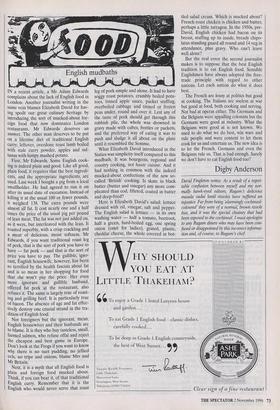English mudb at hs
IN a recent article, a Mr Adam Edwards complains about the lack of English food in London. Another journalist writing in the same vein blames Elizabeth David for hav- ing spoilt our great culinary heritage by introducing the sort of mucked-about for- eign food that now dominates London restaurants. Mr Edwards deserves an answer. The other man deserves to be put on a lifetime diet of traditional English curry: leftover, overdone roast lamb boiled with stale curry powder, apples and sul- tanas with lumpy mashed potato.
First, Mr Edwards. Some English cook- ing is indeed plain and good. Like all good, plain food, it requires that the best ingredi- ents, and the appropriate ingredients, are used. Last week I bought a pig from a local smallholder. He had agreed to run it on after its usual date of execution. Instead of killing it at the usual 100 or fewer pounds, it weighed 138. The extra pounds were almost all fat. It cost nearly one and a half times the price of the usual pig per pound of lean meat. The fat was not just added on, as it were, but interleaved with the lean. It roasted superbly, with a crisp crackling and a meat of delicious, moist softness. Mr Edwards, if you want traditional roast leg of pork, that is the sort of pork you have to have — fat pork — and that is the sort of price you have to pay. The gullible, igno- rant, English housewife, however, has been so terrified by the health fascists about fat and is so mean in her shopping for food that she won't pay the price. Her even more ignorant and gullible husband, offered fat pork at the restaurant, also refuses it. The same is largely true of roast- ing and grilling beef. It is particularly true of bacon. The absence of age and fat effec- tively destroy one crucial strand in the tra- dition of English food. Not foreigners but the ignorant, mean, English housewives and their husbands are to blame. It is they who buy tasteless, small, farmed salmon, who refuse offal and reject the cheapest and best game in Europe. Don't look at the Frogs if you want to know why there is no suet pudding, no jellied eels, no tripe and onions, blame Mrs and Mr Britain.
Next, it is a myth that all English food is plain and foreign food mucked about. Think, if you can bear it, of that traditional English curry. Remember that it is the English who would never serve that roast
leg of pork simple and alone. It had to have soggy roast potatoes, crumbly boiled pota- toes, tinned apple sauce, packet stuffing, overboiled cabbage and tinned or frozen peas under, round and over it. Lest any of the taste of pork should get through this rubbish pile, the whole was drowned in gravy made with cubes, bottles or packets, and the preferred way of eating it was to push and sludge it all about on the plate until it resembled the Somme.
What Elizabeth David introduced in the Sixties was simplicity itself compared to this mudbath. It was bourgeois, regional and country cooking, not haute cuisine. And it had nothing in common with the indeed mucked-about confections of the new so called 'British' cooking. Is skate in black butter (butter and vinegar) any more com- plicated than cod, filleted, coated in batter and deep-fried?
Here is Elizabeth David's salad: lettuce dressed with oil, vinegar, salt and pepper. The English salad is lettuce — in its own washing water — half a tomato, beetroot, half a green, hard-boiled egg, one spring onion (omit for ladies), grated, plastic, cheddar cheese, the whole covered in bot-
tled salad cream. Which is mucked about? French roast chicken is chicken and butter, perhaps a little tarragon. In the 1950s, pre- David, English chicken had bacon on its breast, stuffing up its inside, bready chipo- latas standing guard all round and 14 veg in attendance, plus gravy. Who can't leave well alone?
But the real error the second journalist makes is to suppose that the best English tradition is to eat English food. Sensible Englishmen have always adopted the free- trade principle with regard to other nations. Let each nation do what it does best.
The French are lousy at politics but good at cooking. The Italians are useless at war but good at food, both cooking and serving. Not bad at operas either. The Germans and the Belgians were appalling colonists but the Germans were good at industry. What the Belgians were good at is not known. We used to do what we do best, win wars and rule people and were content to let them cook for us and entertain us. The new idea is to let the French, Germans and even the Belgians rule us. That is bad enough. Surely we don't have to eat English food too?
Digby Anderson
David Fingleton writes: As a result of a regret- table confusion between myself and my nor- mally hawk-eyed editors, Ragam's delicious masala vadai lentil rissoles have suffered an injustice. Far from being 'alarmingly cochineal- coloured' they were of a normal, brown rissole hue, and it was the special chutney that had been exposed to the cochineal. I must apologise to any Ragam diners who may have been con- fused or disappointed by this incorrect informa- tion and of course, to Ragam's chef


















































































 Previous page
Previous page